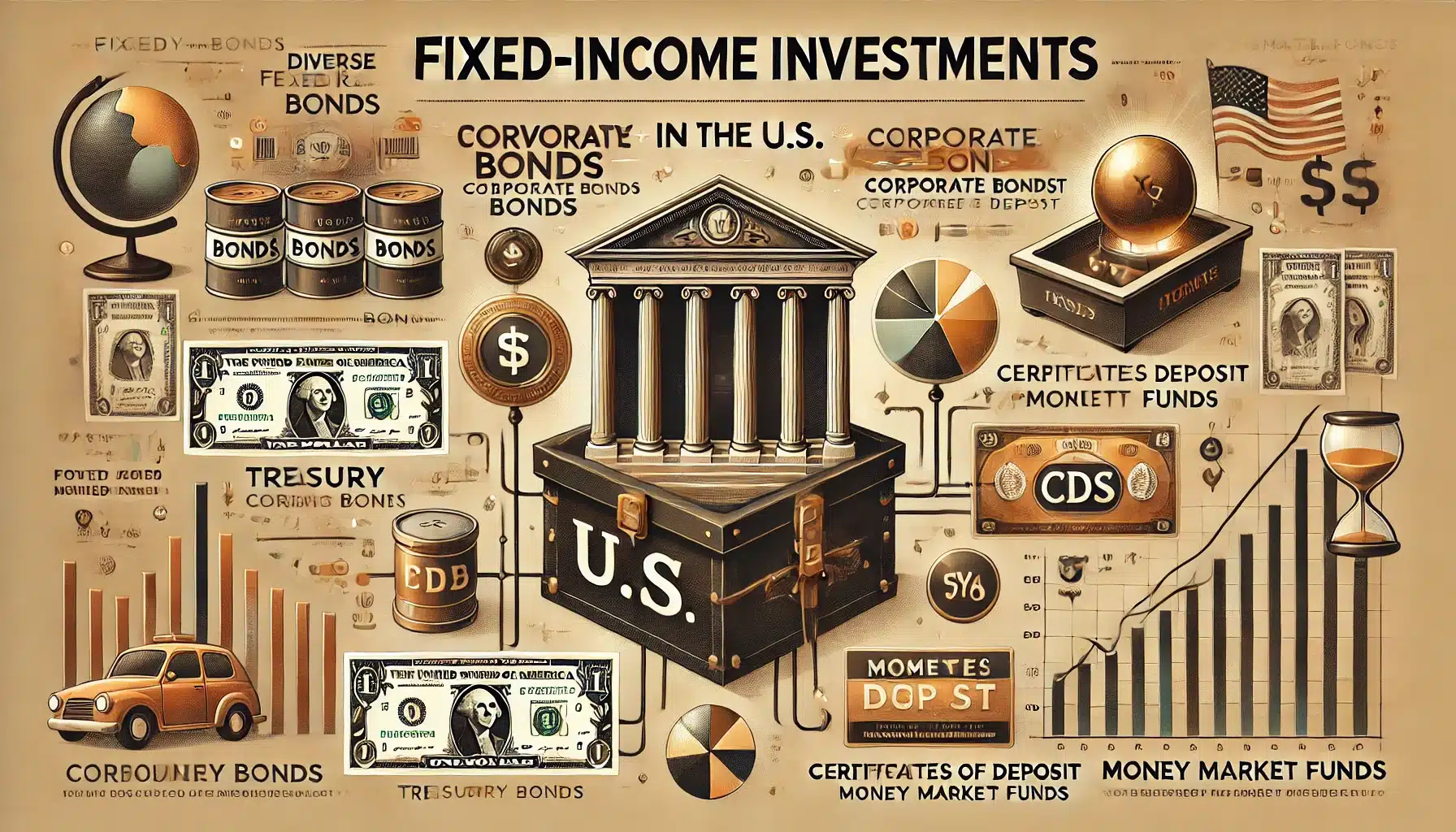Fixed-income investment opportunities in the U.S. offer a stable way to grow wealth, particularly in volatile markets. These assets, including bonds and certificates of deposit, provide predictable income, appealing to a broad range of investors. By understanding the mechanics of fixed-income investments, individuals can leverage these tools to stabilize and diversify their portfolios, achieving goals of safety and gradual wealth accumulation.
Fixed-income securities are essential for providing financial security and predictable income. They are a crucial component for anyone seeking a balanced and resilient investment strategy. This article breaks down the merits and risks, the various investment options available, and how to get started with fixed-income investments in the U.S. to make informed decisions to match personal financial objectives.
Why invest in fixed-income assets in the U.S.?

Investing in fixed-income assets in the U.S. provides many advantages, primarily focusing on security and predictable returns. These investments typically offer regular interest payments, reducing the uncertainty often associated with the more volatile stock market. This reliability makes them an attractive option for investors looking to maintain stable income streams over time.
Additionally, fixed-income investments serve as a hedge against stock market volatility. They are particularly appealing to international investors due to their accessibility and the relatively safe nature of the U.S. economy. With a variety of options available, both resident and foreign investors can find fixed-income solutions that suit different financial circumstances and long-term goals.
Security and predictability of returns
Fixed-income investments are designed to offer stable returns, providing investors with assurance regarding income consistency. Unlike stocks, where dividends can fluctuate, fixed-income securities have agreed-upon interest payments and maturities. This financial predictability plays a crucial role in planning for retirement and managing day-to-day expenses.
In times of economic uncertainty, fixed-income assets are a haven. Investors can rely on these investments to deliver returns that are immune to the market movements, thus ensuring some level of financial stability. Such predictability is especially valuable for those reliant on investment income as a major income source.
Protection against market volatility
Fixed-income securities provide a buffer against market volatility, acting as a stabilizing element within a diversified portfolio. When equity markets become unpredictable, these assets often retain value, supplying a base of security for investors. This characteristic makes them particularly valuable during economic downturns.
Market fluctuations pose a significant challenge to maintaining economic stability, but fixed-income investments can counter these risks effectively. By allocating funds into these options, investors can mitigate the effects of market swings and ensure more consistent portfolio performance over time.
Top Fixed-Income Investment Options in the U.S.
Each investment type has distinct benefits, from government-backed securities to corporate debt and market-based instruments. While some investors prefer the safety of Treasury Bonds and Certificates of Deposit, others seek higher returns through Corporate Bonds or diversified ETFs. Evaluating factors like liquidity, returns, and tax advantages is essential when making an informed decision.
| Investment Type | Risk Level | Typical Returns | Liquidity | Best for |
|---|---|---|---|---|
| Treasury Bonds | Low | 3-5% | Low | Capital preservation |
| Municipal Bonds | Low | 2-4% (tax-free) | Medium | High-income investors |
| Corporate Bonds | Medium | 4-8% | Medium | Higher returns seekers |
| CDs | Low | 2-5% | Low | Secure, fixed returns |
| Money Market Funds | Low | 1-3% | High | Short-term needs |
| Fixed-Income ETFs | Medium | 3-6% | High | Portfolio diversification |
Diversifying among these instruments can enhance portfolio stability while balancing risk and return. Investors should assess their investment horizon and financial goals before choosing the most suitable fixed-income assets.
Treasury and Municipal Bonds
Treasury Bonds (T-Bonds) are considered among the safest investments, offering moderate returns while protecting capital. Municipal Bonds provide tax-free income, making them attractive to high-income investors looking to optimize after-tax gains.
Corporate Bonds and CDs
Corporate Bonds typically offer higher yields (4-8%) than government-backed securities but come with additional risk. Certificates of Deposit (CDs) provide guaranteed returns over a fixed term (2-5%) while safeguarding principal, making them ideal for risk-averse savers.
Key Factors to Consider Before Investing
Before investing in fixed-income assets, understanding key financial factors is essential to maximize returns and mitigate risks. Economic conditions, interest rate trends, and inflation rates directly impact the performance of these investments. Being aware of these factors helps investors choose the best instruments based on their risk appetite and long-term financial goals.
- Interest Rates & Inflation: Rising rates lower bond prices, while inflation reduces real returns.
- Credit Ratings: Higher-rated bonds offer security but lower yields, while lower-rated ones carry more risk but higher returns.
- Tax Implications: Municipal Bonds offer tax benefits, while other instruments may have taxable earnings.
- Investment Horizon: Aligning maturity terms with financial goals ensures stability and optimal returns.
A well-planned fixed-income strategy considers the investor’s liquidity needs, expected returns, and market conditions. Diversifying across different bond types and adjusting allocations based on economic trends can enhance overall portfolio performance.
Final Thoughts
Fixed-income investments offer a stable way to build wealth with predictable returns. By selecting the right mix of assets, considering economic conditions, and aligning strategies with financial goals, investors can optimize their portfolios for long-term success. These assets are especially valuable for individuals seeking security, as they provide consistent income with relatively low risk.
While fixed-income investments do not offer the same growth potential as stocks, they play a vital role in maintaining financial stability. Investors who balance their portfolios with fixed-income securities can reduce market volatility while preserving capital.

